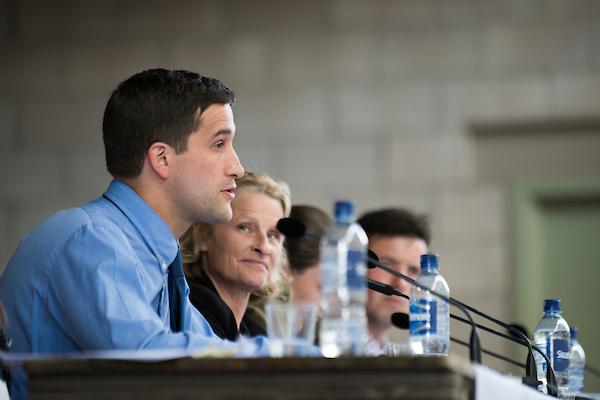RHS Debate Rules Farmers Should Be Paid For More Than Food
21st June 2018 by OFC Press Team

Farmers Should Be Paid For More Than Food was the motion for the OFC debate at this year's Royal Highland Show, and it was carried by a fairly strong majority, echoing the Twitter poll we launched earlier this week in which 85% believed farmers should be paid for public goods. The debate was chaired by BBC Farming Today’s Anna Hilll and led by an impressive panel of young people working in Scotland’s land-based industries to mark Scotland’s Year of Young People.
Speaking to an audience of over 170, dairy farmer from the West of Scotland Colin Ferguson took the commercial line and argued that there should be no support for farmers, that subsidy quashes entrepreneurialism and adversity drives innovation as seen in New Zealand and the dairy sector in Scotland.
Sarah Millar, who works from the Soil Association and sits on Fergus Ewing’s National Council for Rural Advisors, argued that government support money should be spent on services that the market does not deliver, and which the public have declared in polls as important, including promoting wildlife, climate control and clean water. She called for the need to better understand what the public want from farmland and how it is managed, as well as for farmers to market themselves better to illustrate what they are doing for public good. She cited the example of peatland restoration which cleans water, stores carbon, increases biodiversity and feeds sheep, which in turn is a food source for the population.
National Chairman of the Scottish Association of Young Farmers Clubs (SAYFC), David Lawrie, put forward the challenge that UK agriculture is commercial but that there is a place for public money to support the environment. He suggested that the system moves away from headage payments, however, to make farming more efficient.
Deer stalker and Lantra Learner of the Year 2018, Megan Rowland, was awarded a bottle of champagne by Brodies LLP for her thought-provoking argument for land use and the knock-on effect it has on other farming nations around the world, and how the UK is well positioned to adopt successful land management practices from other countries.
Clive Phillips, Head of Land & Rural Business at Brodies LLP, Solicitors, said:
“It is no surprise that an audience at a predominantly agricultural event should reach this result. The real challenge is to take the question to the general public, the consumer, taxpayer and voter to gain their buy-in and support. That is the challenge for all advocates in the agricultural sector and particularly for the young leaders of the future to make that case to government, and more so the public, that profitable agriculture, where farmers are properly remunerated by the market and public support, underpins food production and public goods. From the quality of today’s debate I have no doubt that they can be successful in their endeavours.”
In the Twitter poll running up to the event, which reached audiences through OFC and Brodies LLP, 15% believed farmers should not be paid for providing public goods. Asked what services farmers should provide for the public good, 53% voted for enhancing the environment and 30% for education and tourism; 8% voted for forestry, and other suggestions included providing health and social care.
This year’s debate organiser and OFC Director, Sally Williams, who is a dairy farmer from South East Scotland, said:
“I am delighted that the Oxford Farming Conference provides a platform for open discussion and debate like this, and the young panel today did rural Scotland proud with their lucid arguments for the future of our land-based industries.”
